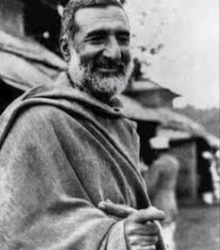Heathcote Williams is not a Muslim and finds the Koran “about as enjoyable as eating gravel.” But his belief in, and devotion to, the “Muslim Ghandi” led him to write a book-length investigative poem Badshah Khan: Islamic Peace Warrior, published in June by the London-based Thin Man Press. It is one of Williams’s best polemics in a Shelleyan genre that he has remade for our era.
In the poem he describes Khan — a lifelong activist for Pashtun independence and an opponent of religious sectarianism — as a man who stood “six foot five inches tall, / straight-backed, even at ninety-eight years old,” someone for whom “the primary meaning of jihad was not war / To spread Islam but to rescue the weak from persecution.”The other day, in the magazine Resurgence & Ecology, Williams reflected on Badsha Khan’s life and achievements, beginning this way: “Badshah Abdel Gaffar Khan was a close friend of Mahatma Gandhi and in every sense his Muslim counterpart. Yet whereas a statue of Gandhi was unveiled in London’s Parliament Square in March this year, relatively few in the West have heard of Badshah Khan, Islamic peace warrior. A sorry state of affairs when now, more than ever, we need a Muslim peace icon.”
Williams points out that “this impassioned and courageous Muslim hero, who was still fighting for peace in his nineties and was regularly imprisoned for his political beliefs by both the British and the Pakistanis [is] a powerful counterweight to the stereotypes and Islamophobic hysteria currently being peddled by the West.” He notes, moreover, that “violent resistance did not impress Khan as particularly effective.”
Nevertheless, long after their peace warrior’s death (in 1988), Pashtun fighters have continued an armed struggle for independence. Take a look at this video, posted back in 2012 with words by Williams and narration and montage by Alan Cox. Although U.S. ground troops have largely withdrawn from Afghanistan, drone strikes have continued and the bitter devastation left in their wake remains.

